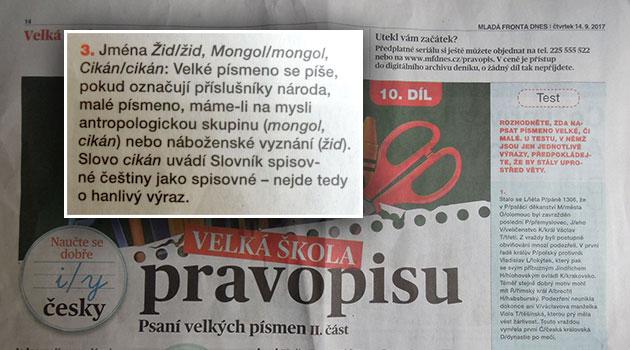Alica Sigmund Heráková responds to Czech daily about the word "gypsy": Yes, it is derogatory

On Friday the Czech newspaper Mladá fronta DNES published a special insert on the use of capital and lower-case letters in the Czech language as part of its regular series on Czech grammar, and the autor included the word “gypsy” (cikán) as one of the examples. For the time being we will not discuss whether or not this word should be capitalized.
My attention was attracted by a different statement in the piece. “The word gypsy is listed in the Dictionary of Written Czech as appropriate for use when writing – it is not, therefore, a derogatory expression,” the newspaper alleged.
Discussions on online social networking sites, however, have demonstrated that the derogatory nature of that expression is a topic of current concern for many people – logically, mostly for those who are labeled by it. It is, therefore, necessary to repeat an important fact once again.
At the founding congress of the International Romani Union in London in 1971, the word “Rom”, which Romani people have used since time immemorial to refer to themelves, was declared to be the expression we want the majority society to use when referring to us as well. (“Rom” here is what is called in linguistics an endonym).
The word “cikán” in Czech is not a Romanes language word, but comes from the Greek term “athinganoi”, the etymylogical meaning of which is “untouchable”, and which has always been used by the majority society there in various contexts. (“Cikán” here is what is called in linguistics an exonym).
It is possible that in a Czech-language conversation among individuals who have a good relationship with one another a Romani person might not perceive being marked as a “cikán” during the conversation as something negative, even if the person doing so is a “gadjo” or non-Rom (which is another term we could have an interesting debate about). It is also possible that some Romani people are accustomed to referring to themselves this way, as was normal during the communist regime.
When this does happen, it most often involves the vernacular term “cigán”, which is absolutely, evidently pejorative. Be that as it may, for Romani people the Czech term “cikán” is one of abuse.
This term is used in such a way primarily during public debate, and it is used that way by the media. The fact that Czech linguists and the authors of the Dictionary of Written Czech are not able to reflect that fact in their work is absolutely significant.
The author of the article at issue here, Jiří Kostečka, wrote the following in reponse to criticism of his claims that “cikán” is not a derogatory term: “Normative guidelines are created – through the care of top linguists – precisely to authoritatively communicate what is the norm for writing a given language and what is not.” Yes, Romani people are indeed accustomed the negation of their perspective being the norm here.
Another of the author’s justifications is a slap in the face to anybody endeavoring to achieve the emancipation of ethnic Romani people. “Naturally there do exist in the Czech language expressions that genuinely do not belong in the vocabulary of polite society and it is exactly the members of polite society who voluntarily, and without being ordered to do so by anybody else, do not use those expressions. The word Cikán/cikán (Gypsy/gypsy), however, does not belong among them,” he explains in an email which has been made available to editors of the Romea.cz news server.
I must be bitterly ironic at this juncture. We Roma thank you, Mr Kostečka, and we thank the creators of the Dictionary of Written Czech, for not considering us part of polite society, as linguistically speaking we continue to remain on its outskirts, albeit with Czech citizenship.
We thank you for perceiving our request as something inappropriate. We thank you for using, constantly and for decades, a linguistic anachronism that was made an official part of Czech public discourse by the communist regime.
We thank you for adamantly defending your right to the freedom to consider abusive only what is abusive of YOU and to label us however it suits you. This demonstrates the sad fact that the diffrent people living here still desperately lack some kind of a common, unifying identity of “WE”.
I am asking for at least a linguistic gesture of that unity. The word “cikán” (“gypsy”) is a term of abuse.
